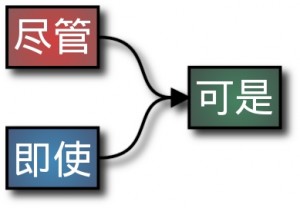尽管 and 即使 in Mandarin: 'even though'' vs ''even if'''
 Both 尽管 (jǐnguǎn) and 即使 (jíshǐ) are used to emphasise contrast in Mandarin Chinese, and both can be followed by 却 (què) or 可是 (kěshì). Both of them can be translated as ‘even’.
Both 尽管 (jǐnguǎn) and 即使 (jíshǐ) are used to emphasise contrast in Mandarin Chinese, and both can be followed by 却 (què) or 可是 (kěshì). Both of them can be translated as ‘even’.
They are used for different situations, though. The difference is that 即使 is used for hypothetical situations, whilst 尽管 is used to connect unexpected facts.
即使: ‘even if’
即使 is for hypothetical or conditional statements, and describes unlikely or extreme situations.
Examples:
即使那家饭馆做的菜好吃极了,我却不想在那里吃饭。 J íshǐ nà jiā fànguǎn zuò de cài hǎochī jí le , wǒ yě bù xiǎng zài nàli chīfàn. “Even if that restaurant did very tasty food, I wouldn’t like to eat there.”
即使有比你漂亮的人,也不会多。 Jíshǐ yǒu bǐ nǐ piàoliang de rén , yě bùhuì duō. “If there even are people more beautiful than you, there won’t be many of them.”
即使我的钱够了,我也不会买一辆法拉利。 Jíshǐ wǒ de qián gòu le , wǒ yě bùhuì mǎi yí liàng fǎlālì. “Even if I had enough money, I still wouldn’t buy a Ferrari.”
尽管: ‘even though’
尽管 is used to link statements of fact, i.e. where the situation is already as described. In all of the example sentences above, 即使 could grammatically be replaced with 尽管, which would change the meaning to:
“Even though that restaurant does very tasty food, I still don’t want to eat there.” “Although there are people more beautiful than you, there aren’t many of them.” “Even though I’ve got enough money, I still won’t buy a Ferrari.”
More examples for 尽管:
尽管美国是个发达国家,却还有些很贫穷的人。 Jǐnguǎn Měiguó shì ge fādá guójiā , què hái yǒu xiē hěn pín qióng de rén. “Even though America is a developed country, it still has some very poor people.”
尽管喝酒对身体不好,很多人还是喜欢喝。 Jǐnguǎn hē jiǔ duì shēntǐ bù hǎo , hěn duō rén háishì xǐhuān hē . “Even though alcohol is bad for you, a lot of people still like to drink it.”
尽管他的考试成绩不高,毕业以后还是很成功。 Jǐnguǎn tā de kǎoshì chéngjì bùgāo , bìyè yǐhòu háishì hěn chénggōng. “Although his exam scores weren’t very high, he was still successful after graduation.”
